General
Vice Chancellor’s Roster against Sexual Harassment Meets, Shares Milestones & Experiences
Published
3 years agoon
By
Mak Editor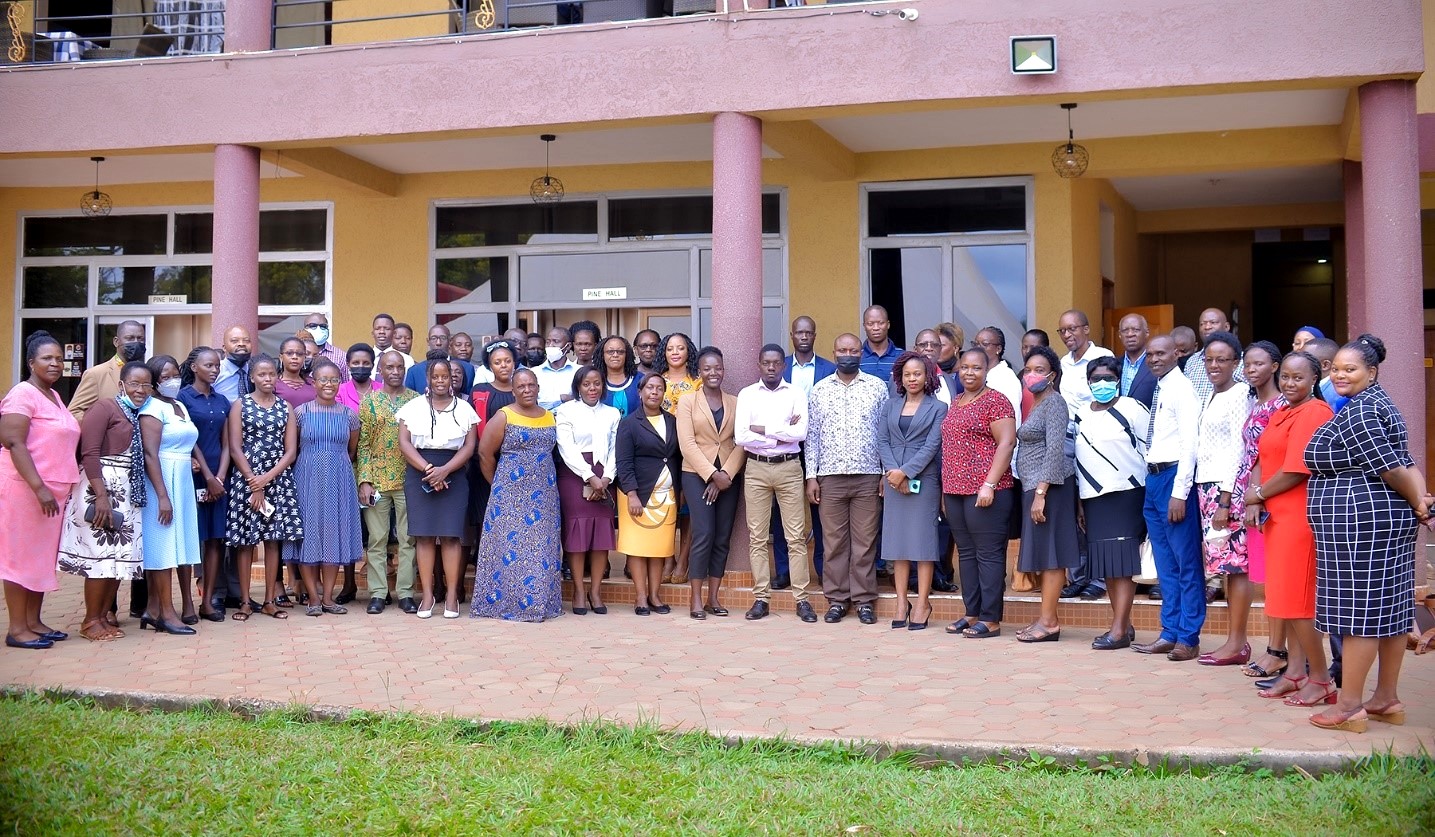
The Vice Chancellor’s Roster of 100 to investigate Sexual Harassment at Makerere University has called upon the University Leadership to reinforce its commitment and support toward elimination of violence, abuse and sexual harassment at the university. This was during the two days (14th– 15th June 2022) of the Refresher Training that was organized by Makerere University Gender Mainstreaming Directorate in partnership with UN Women.
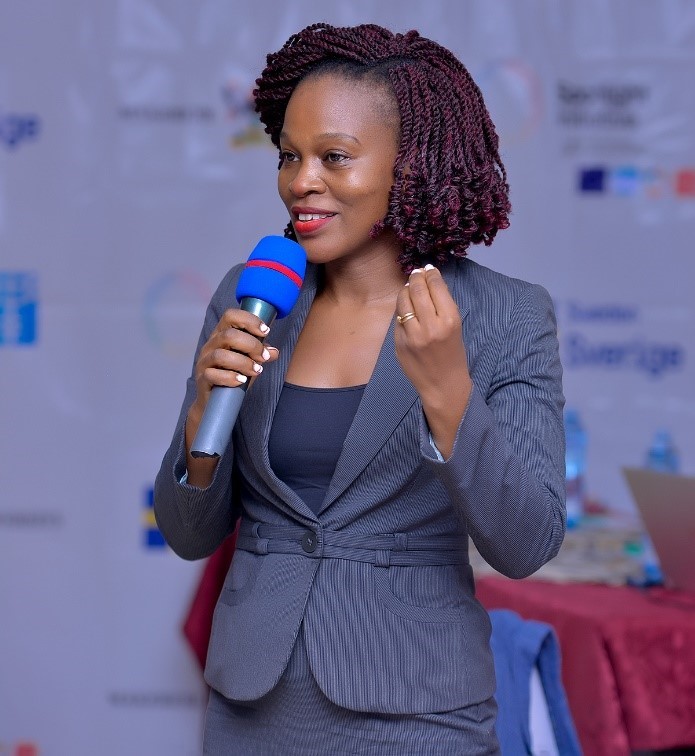
In line with section 18 part (a) of Makerere University Policy and Regulations against sexual harassment 2006 (as amended), the Vice-Chancellor on 1st August 2019, appointed 100 members of the Vice Chancellor’s Standing Roster to investigate sexual harassment.
According to Makerere University Policy and Regulations against Sexual Harassment, the Vice Chancellor’s Roster of 100 includes well-selected persons of integrity from which ad-hoc committees will be drawn to investigate specific reported complaints of sexual harassment. The Roster represents all categories of groups in the University community that is; academic, administrative, and support staff, students (undergraduate and postgraduate) as well as all hierarchical ranks within those categories.
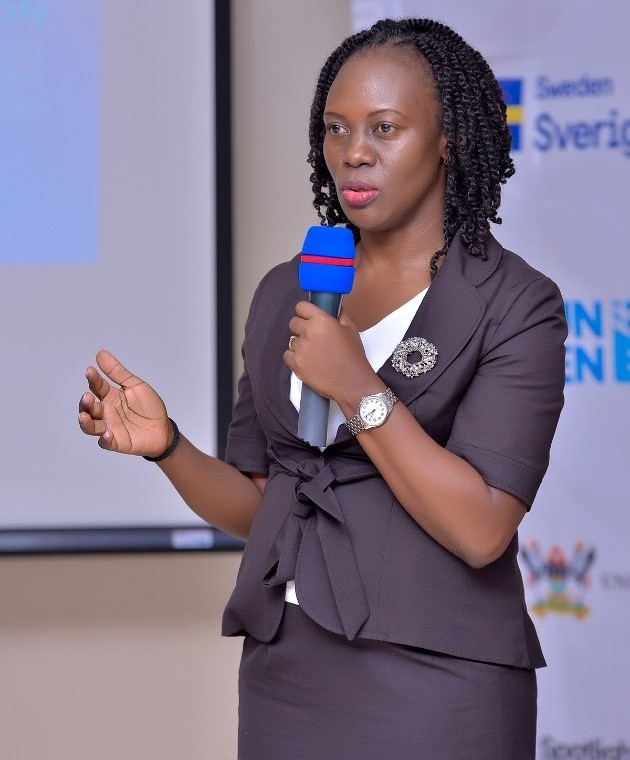
The team appreciated the University Management for taking a bold step aimed at breaking the power-authority chains that had acted as barricades to perpetrators and protected them as untouchables. They further appealed to the University leadership to always cooperate and support the teams/members investigating sexual harassment cases. “We need back up from the leadership to ensure that however powerful a person is, as long as they have been mentioned in any Sexual Harassment scandal, they are not protected.”
During the training, the team recognized the critical importance of their work and also highlighted the possible risks involved when investigating sexual harassment cases including death threats to both the victims and investigators. In addition, the team recorded the need to intensify sensitization campaigns in order to reduce the knowledge gap on Gender-Based Violence, abuse, and sexual Harassment that exists among staff and students as well as the wider University community.
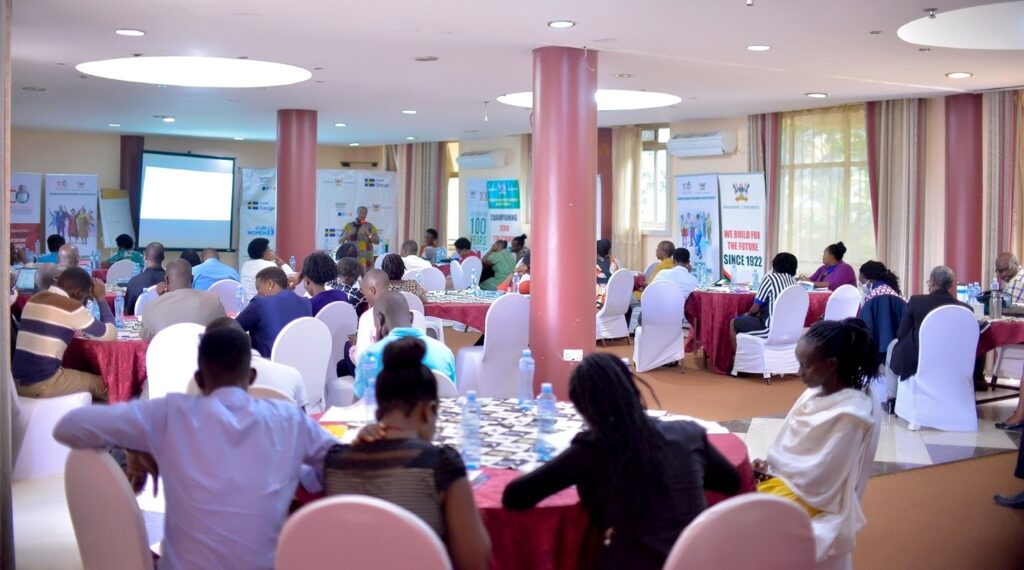
Sharing milestones and experiences
The team also shared experiences, and progress achieved throughout the two years of executing their work. In a presentation made by Ms. Susan Mbabazi, the Principal Gender Officer -Gender Mainstreaming Directorate, since 2019, the VC’s Roster of 100 has been able to investigate to conclusion eight (8) cases out of the twenty-two that were reported.
“Twenty-two cases have been reported for the last two years, eight (8) were investigated to conclusion of which five (5) were successfully handled and three (3) were acquitted, one (1) case has been referred to the police; Three (3) cases were overtaken by events and they lost jurisdiction and one (1) case was withdrawn,” she said.
Ms. Mbabazi noted that the results indicate a stronger step that has been taken by the team to execute their duties amidst recognizable challenges including the COVID-19 pandemic that hit the world for two years. She was optimistic that after the lockdown, their work will be much easier, highlighting the Nine (9) cases that are currently being investigated.
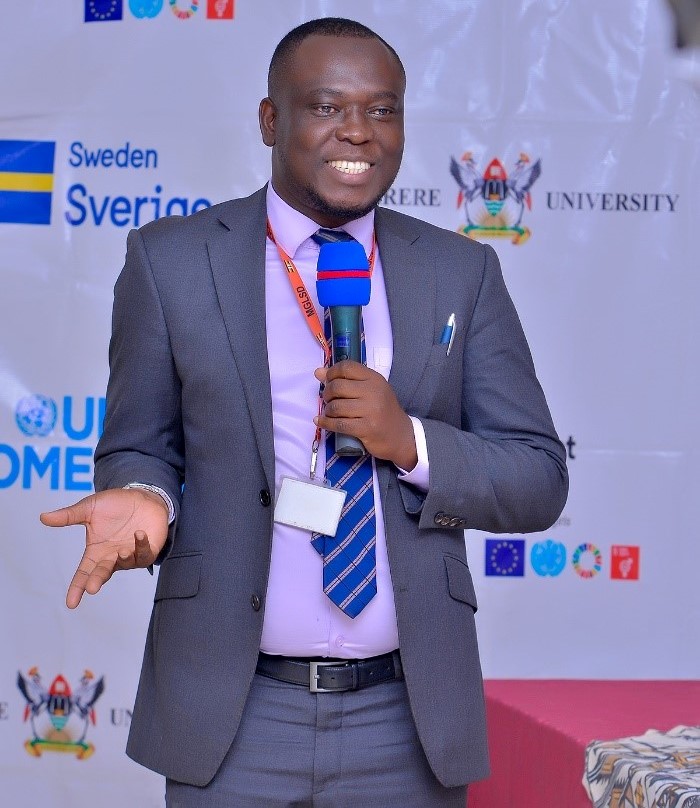
In the same training, participants also reflected on the Makerere University Gender Equity Policy and Policy and Regulations against Sexual Harassment as key tools in the fight against the vice at the university. In an interactive session conducted by the Director of Gender Mainstreaming, Dr. Euzobia Mugisha Baine, the team called for an enhancement in the dissemination and communication of the two policies to both staff and students.
“It is high time we utilize all the communication and information points of the university to communicate and emphasize the importance of the two policies. The extended knowledge of the policies should be one of the key performance indicators for the University and students’ leadership,” they noted.
In a speech read by Ms. Nina Asiimwe Byarugaba, the Deputy Country Representative of UN Women Uganda Ms. Adekemi Ndieli, commended Makerere University for the review and production of the Policy and Regulation Against Sexual Harassment; noting that the policy provides the much-needed institutional framework to effectively respond to sexual harassment issues in a well-coordinated, coherent fashion, one that will particularly promote perpetrator accountability.
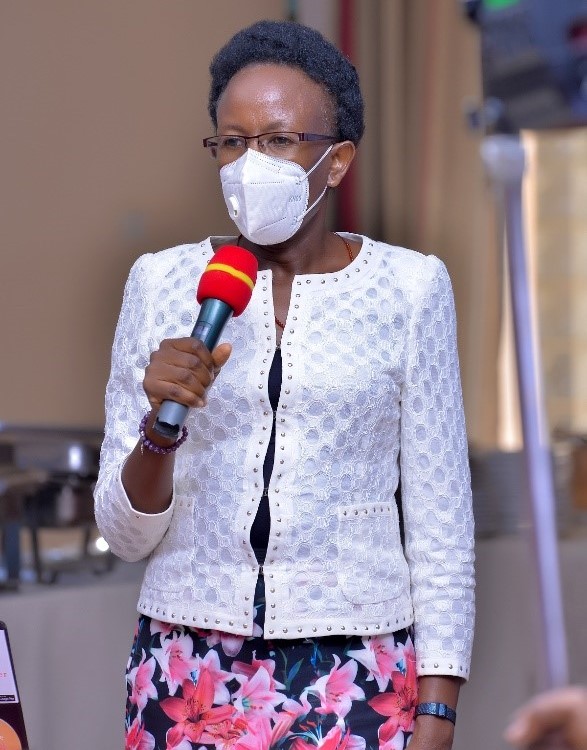
“UN Women in Uganda is committed to ending all forms of violence against women and girls. We recognize that ending violence against women and girls is a critical move to ensure that they have access to justice. We emphasize that access to justice is an essential ingredient for effective, accountable, and gender-responsive to the realization of women’s and girls’ rights which cannot be denied,” she said.
Noting that violence against women and girls is highly pervasive, entrenched and normalized in Uganda, Ms. Ndieli, stressed, that although efforts have been put in place to abate it, through legislation and sensitization of the relevant duty bearers on how to effectively manage gender-based violence cases, obtaining full protection and accountability of GBV crimes remains a challenge.
“We are mindful of the fact that efficient and effective management of gender-based violence cases requires extensive preparation, specific skills, substantive knowledge and resources, and the Policy and Regulation Against Sexual Harassment is a critical solution to these needs,” she noted.
She extended sincere appreciation to the Gender Mainstreaming Directorate and Makerere University for conducting a refresher training for members of the Vice Chancellor’s Roster of 100 as a follow-up on progress as well as re-equipping the team with skills and techniques for addressing some of the persistent challenges of access to justice for women and girls.
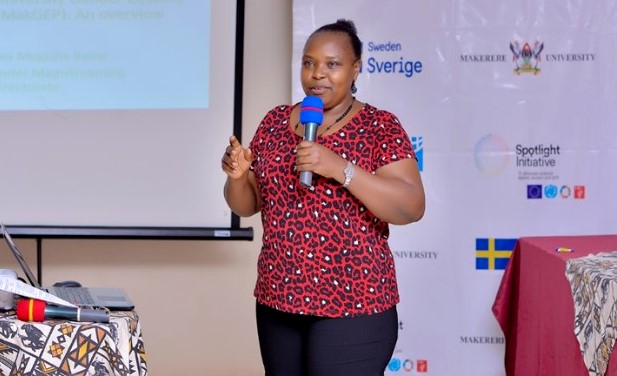
Members also highlighted the role of men in the elimination of gender-based violence and particularly, sexual harassment among communities. In a presentation made on Male Engagement in Gender equality interventions: What can men do to work with women in challenging sexual harassment and gender-based violence at Makerere University, Dr. Julius Kikooma noted the manner in which the socialization processes are embedded within the men’s sexuality and their psyche is ill-explored. According to him, the socialization processes that men undergo in their sexual development can lead them toward normalizing sexual violence.
He called for collective efforts to harness positive masculinities to promote an educational environment that is free of sexual harassment. In the same spirit, Dr. Kikooma urged the Makerere University community to open up opportunities to question hegemonic beliefs and practices upon which harmful forms of masculinities in Higher education institutions are constituted.
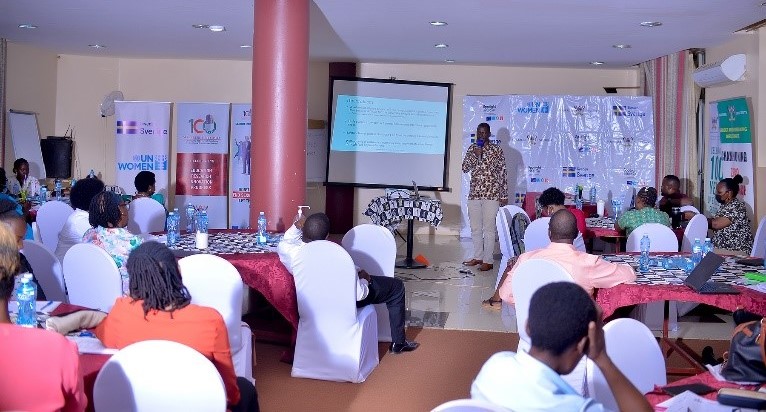
“We need to rethink and re-imagine institutions of higher learning as intellectual spaces with Institutionalized structures and spaces that promote conversation on progressive male behaviors and practices,” he stated.
Participants were also engaged on:
- Legal and Policy Frameworks for Gender-Based Violence and Violence against Women and Girls by Mr. Mayanja Idi Mubarak, Principal Women in Development Officer- Ministry of Gender, Labour and Social Development
- Sexual Harassment Prosecutions; Lessons from the Office of the Director of Public Prosecutions by Samali Wakooli, Assistant Director of Public Prosecutions and Head of Gender Children and Sexual Offences Department.
- Sexual Harassment Investigations; Lessons from the Uganda Police Force by Rose Nalubega, Commissioner, Sexual, Children Offences and Trafficking in Persons Department, Directorate of CID, Uganda Police Force.
- Strategies for effective staff and student mobilization against sexual harassment by Prof. Fred Babweteera
You may like
-


Simplicity, Service & Scholarship: Hallmarks of Professor Livingstone Luboobi’s Legacy
-


EfD-Mak Holds 2nd Advisory Board Meeting: Charts Path for Growth
-


Public University Legal and Accounting Officers Trained on Governance and Compliance
-


Celebrating the Life of Prof. Livingstone Sserwadda Luboobi
-


Fare Thee Well Prof. Luboobi
-


Strengthening Grants Management Through Institutional Collaboration and Capacity Building
General
Simplicity, Service & Scholarship: Hallmarks of Professor Livingstone Luboobi’s Legacy
Published
10 hours agoon
July 18, 2025By
Eve Nakyanzi
On Wednesday 16th July 2025, Makerere University lost one of its most cherished sons, Professor Livingstone Sserwadda Luboobi. Described as a mathematician, academic leader, and humble servant, Professor Luboobi devoted more than five decades to the university, rising through the ranks to become Vice Chancellor, and leaving a legacy defined by simplicity, service, and scholarship.
Born to Lameka Serwadda and Sanyu Serwadda on 25th December 1944 in Mitondo, Kalisizo, Kyotera District, Professor Luboobi’s academic career begun as a third-year student at Makerere and continued with unwavering loyalty until his passing. His life’s work reflected not only a commitment to mathematics but also nurturing generations of scholars and leaders across Uganda and beyond.
A funeral service was held in his honour at St. Francis Chapel, Makerere University on 18th July 2025. It was a moment of solemn remembrance and heartfelt tribute. Rev. Canon Dr. John Senyonyi delivered the sermon titled “Only God Knows,” reminding mourners of the mystery and grace of life’s journey. Rev. Canon Geoffrey Byarugaba represented the Kampala Diocese at the service, while former St. Francis Chaplain, Rev. Dr. Canon Johnson Ebong thanked Professor Luboobi for spearheading the Chapel’s expansion. Friends, colleagues, and family members filled the chapel, joined in mourning but also in gratitude for a life that had deeply touched theirs.

Mrs. Lorna Magara, Chairperson of the University Council, spoke movingly about Professor Luboobi’s faithfulness, likening his life to the biblical call in Mark 10:43, “Whoever wants to become great among you must be your servant.”
In his condolence message, the Vice Chancellor, Professor Barnabas Nawangwe, hailed Professor Luboobi as a visionary leader whose legacy is deeply woven into Makerere’s identity as a research-led institution. He credited Professor Luboobi with laying the groundwork for a culture of inquiry—championing graduate programmes, encouraging doctoral training, and fostering international collaborations that strengthened the university’s research profile. “He believed in building systems, not just structures,” noting that many of Makerere’s current research policies stem from his leadership. Even in retirement, Professor Luboobi remained a source of wisdom and guidance, quietly shaping the future of the university he so deeply loved.
Speaker after speaker painted a portrait of a man who led not by pomp, but by quiet strength and deep conviction. The Principal, Professor Winston Tumps Ireeta, speaking on behalf of the College of Natural Sciences (CoNAS), described Professor Luboobi as a foundational figure whose influence is deeply etched in the structures and spirit of the college. He spoke with emotion about Luboobi’s unwavering commitment to academic integrity and his belief in the power of mentorship.

“He was not just a mathematician,” Professor Ireeta said, “he was a visionary who understood the soul of the university. Even in retirement, he remained an advisor, a guide, and a quiet force of wisdom.” He concluded by saying that the college would continue to draw from his example as it navigates the future of science and innovation in Uganda.
Professor Luboobi’s illustrious career at Makerere University included serving as Head, Department of Mathematics from 1990 to 1991. The current Head of Department, Dr. Ismail Mirumbe remembered him as a pillar in the teaching and development of mathematics in Uganda
Professor John Mango, who served as Head, Department of Mathematics during Professor Luboobi’s term as Vice Chancellor from 2004 to 2009 described him as a towering figure of integrity and principle, someone who not only upheld the highest standards of academic conduct but insisted that others around him do the same. “He was a pillar in the department,” Prof. Mango remarked, “and his moral compass was unwavering.”

He recalled instances where Professor Luboobi made firm decisions, including terminating contracts when integrity was compromised, setting a tone that shaped the department’s reputation for honesty and excellence. Even as Vice Chancellor, he remained deeply involved in the department’s affairs, teaching, supervising students, all the while handling top administrative duties punctually. Prof. Mango spoke with great admiration of a man who led by example, mentored many, and whose contributions to mathematics education, research, and policy-making continue to shape the future of the discipline in Uganda and beyond.
According to an article from 1990 written by Dr. Vincent Ssembatya and Andrew Vince at the University of Florida, the Uganda Mathematical Society (UMS), which was formally established on 25th November, 1972 has since inception enjoyed major support from Makerere University and Kyambogo University in terms of infrastructure and leadership. Professor Paul Mugambi, who was also present at Professor Luboobi’s funeral service was elected first president of the UMS. Dr. Saul Nsubuga from the Department of Mathematics represented UMS at the service, honouring Professor Luboobi’s pioneering role in the discipline.
The service also featured tributes from close friends and family. Loved ones shared stories of a man who remained grounded no matter how high he rose, a man who valued relationships and walked closely with his faith. His children and grandchildren remembered him as a father who was ever-present, a listener, and a source of steady guidance.

Professor Daniel Kibuule, son of the late Professor Luboobi and Dean, Faculty of Health Sciences at Busitema University, delivered a deeply personal tribute that painted a full portrait of his father’s life, values, and final days. He expressed gratitude to the University leadership, family, friends, and medical professionals who stood with them during a challenging period. He particularly thanked his siblings, Dr. David Kimera and Dr. Irene Nakiyimba for their unwavering role in caring for Professor Luboobi through illness.
He spoke of a man who, despite great academic accolades, remained deeply humble and committed to discipline, simplicity, and faith. From instilling punctuality and responsibility to ensuring his children charted their own paths, none bearing his surname “Luboobi”, Prof. Luboobi was intentional in every lesson he passed on. Kibuule recalled his father’s insistence on being at home even in his final moments, his strong connection to Christ, and his quiet strength despite his failing health.
Former students and mentees echoed the same sentiments, of a teacher who was generous with his time and invested deeply in others’ growth. The community that gathered was not only there to grieve but to celebrate the quiet legacy of a man whose example continues to live on.
Among the mourners were public figures and leaders, including Hon. Abed Bwanika, Member of Parliament for Kimanya-Kabonera, Hon. Nyombi Thembo, the Executive Director Uganda Communications Commission, and Hon. Dr. Ham-Mukasa Mulira, former Minister of ICT, among others.
In his passing, Makerere University has lost a pillar, but his life reminds us that greatness lies in consistency, in humility, and in service to others. Professor Luboobi’s memory will continue to live on in the minds he shaped, the systems he built, and the values he embodied. He ran his race with grace.
The Writer is a Volunteer in the Public Relations Office, Makerere University
Please click the embedded video below to view the service livestream
General
Public University Legal and Accounting Officers Trained on Governance and Compliance
Published
2 days agoon
July 17, 2025By
Eve Nakyanzi
Legal and accounting officers from public universities across Uganda have convened, for a high-level training workshop organized by Makerere University. The three-day training, taking place from July 16th to 18th, 2025, is aimed at strengthening legal frameworks, improving institutional governance, and ensuring compliance with public finance and procurement laws within higher education institutions.
Ms. Lorna Magara, Chairperson of the Makerere University Council and Guest of Honour at the opening session, commended the initiative as timely and necessary. She addressed the growing backlog of court cases affecting Makerere and other public universities and outlined measures already taken to mitigate legal risks. These include the establishment of a Legal Rules and Privileges Committee and the Directorate of Legal Affairs, part of a broader strategy to improve legal compliance and foster good governance.
Representing the Vice Chancellor, Prof. Winston Tumps – Ag. Deputy Vice Chancellor (Finance and Administration), described the training as both strategic and practical. “It is imperative that we learn from each other, especially in how we handle employee litigation and institutional legal risks,” he remarked. He added that the program is designed to promote experience-sharing across universities and enhance collective institutional growth.

In his address, Mr. Yusuf Kiranda, University Secretary at Makerere University, emphasized the urgent need for robust legal oversight and more effective case management mechanisms within public universities.
The training featured a keynote address by the Attorney General of Uganda, Hon. Kiryowa Kiwanuka, who provided critical insights into legal expectations for public institutions. He warned that failure to heed legal advice could result in personal liability for accounting officers, citing a precedent involving the Uganda Cancer Institute. “Universities must consult the Attorney General’s chambers before entering into major contractual obligations,” he advised, urging legal officers to document decisions meticulously as proper record-keeping forms the first line of defense in legal disputes.

Hon. Kiwanuka further discussed the government’s ongoing efforts to recentralize legal services to ensure alignment with the Attorney General’s office. He cautioned in-house counsel against becoming overly entangled in decision-making processes, stressing the need for objectivity. Other key issues he addressed included contract approvals, misuse of Memoranda of Understanding (MoUs), and lapses in procurement processes, particularly at the close of financial years.
Participants also benefited from insights by Hon. Justice Musa Ssekaana of the Court of Appeal, who offered an in-depth analysis of judicial review and its significance in promoting lawful, transparent university governance. He called on university legal officers to act with clarity, timeliness, and accountability.
Lady Justice Joyce Kavuma, Judge of the High Court, delivered a comprehensive presentation on dispute and claim management involving public universities. She addressed emerging trends in civil litigation, emphasizing the importance of due process, transparency, and clear communication in resolving employment, student, and contractual disputes. Drawing on real case examples, she urged institutions to strengthen internal systems, embrace participatory governance, and adopt regional best practices to minimize litigation and protect institutional reputation.

The training reflects a shared commitment among public universities to build a more accountable, legally sound, and strategically aligned higher education system in Uganda. Through peer learning and collaboration, participating institutions aim to reduce litigation, enhance institutional autonomy, and uphold the rule of law.
Participating universities include Makerere University, Kyambogo University, Mbarara University of Science and Technology, Busitema University, Mountains of the Moon University, and Lira University.
The training concludes on July 18th 2025, with sessions focusing on employment dispute management in public universities and the implications of recent PPDA Appeals Tribunal decisions on procurement and disposal practices within public entities.
General
Celebrating the Life of Prof. Livingstone Sserwadda Luboobi
Published
2 days agoon
July 17, 2025By
Mak Editor
A Visionary Leader, Seasoned Mathematician, & Humble Academician
It is with profound love and respect that we celebrate the life of Prof. Livingstone Sserwadda Luboobi, a distinguished scholar, transformative leader, and beloved Vice Chancellor Emeritus of Makerere University. His legacy is woven in the fabric of African higher education, marked by intellectual brilliance, unwavering commitment to academic excellence, and a life of selfless service.
A Life of Purpose and Vision
Prof. Luboobi was more than a mathematician. He was a visionary, whose work transcended equations and research papers. Serving as Vice Chancellor from 2004 to 2009, he led Makerere University through a critical period of growth and transformation. Under his guidance, the university expanded its reach, strengthened its academic rigor, and embraced innovation and reform. His calm demeanour and principled decision-making earned the admiration of students, faculty, and peers alike.
Prof. Luboobi was deeply committed to nurturing talent and fostering intellectual curiosity, leaving an indelible mark on the institution’s culture and future direction.
Beyond Uganda, Prof. Luboobi’s influence resonated across the global academic community. He was a passionate advocate for the transformative power of science and education, often speaking at international forums and collaborating on research that bridged continents and disciplines. His work helped elevate the profile of African scholarship on the world stage.
His legacy endures not only in the impressive body of work he left behind but also in the countless lives he touched – students, educators, and leaders who continue to draw inspiration from him.
Academic and Leadership Journey at Makerere University
An illustrious alumnus of Makerere University, Prof. Luboobi graduated with First Class Honours in Mathematics, laying the foundation for an extraordinary academic journey. He pursued further studies at the University of Toronto (MSc in Operations Research, 1971-72) and the University of Adelaide (PhD in Biomathematics, 1978–80). His scholarly journey spanned prestigious institutions worldwide, including UCLA, the University of Bergen, and the University of Dar es Salaam, establishing him as a scholar of global repute and a proud ambassador of African intellectualism.
Prof. Luboobi’s service to Makerere begun in 1970 as a Special Assistant-remarkably, while still an undergraduate, rising through the ranks to full Professor in 1997. He served as Head of Department, Dean of the Faculty of Science (1994–2001), and later became the university’s first elected Vice Chancellor. His tenure brought new energy to institutional leadership, characterized by transparency, inclusivity, strategic direction and accountability.
Strategic Reforms and Institutional Impact
A true architect of transformation, Prof. Luboobi chaired the development of Makerere’s first locally-conceived Strategic Plan (1990–91). He was instrumental in securing a UGX30 billion grant from NORAD in 1999, which revitalized key academic areas such as computing, gender studies, and food science. He co-founded the Makerere University Private Sector Forum, bridging the gap between academia and industry, and strengthening alumni engagement and resource mobilization.
Pioneering Biomathematics and Mentorship
As one of Africa’s pioneering biomathematicians, Prof. Luboobi introduced mathematical modeling to tackle real-world problems in epidemiology, ecology, and operations research. His scholarly contributions – over 150 publications – reflect the depth and breadth of his research. Yet, perhaps his most lasting impact lies in mentorship: he supervised more than 35 PhD and over 50 MSc students, including Makerere’s first female PhD graduate in Mathematics, nurturing a generation of scholars and leaders.
Prof. Luboobi’s Contribution to the Internationalization of Makerere University
Prof. Luboobi played a pivotal role in advancing the international profile of Makerere University. Demonstrating remarkable personal commitment, he utilized his own resources to support the establishment of the University’s International Office. This strategic initiative laid the foundation for a more structured and effective engagement with global academic institutions, development partners, and international students. As a result, Makerere University significantly enhanced its global footprint, forming numerous international collaborations and attracting increased academic and research opportunities from abroad.
In addition to his contributions to internationalization, Prof. Luboobi was also instrumental in revitalizing the University’s Public Relations Unit. Under his guidance, the unit adopted more proactive and professional communication strategies, which greatly improved the institution’s public image. This, in turn, fostered greater public trust and strengthened the university’s reputation both locally and internationally. His visionary leadership in these areas has had a lasting impact, positioning Makerere University as a leading institution in East Africa and beyond.
Global Recognition and Enduring Legacy
Prof. Luboobi’s contributions earned him widespread recognition. In 2008, the University of Bergen awarded him an Honorary Doctorate for his role in internationalizing academia. Makerere University honoured him with a Lifetime Achievement Award in 2013, and the Government of Uganda conferred upon him a National Gold Medal for his unwavering service to education and national development.
Even after retirement, Prof. Luboobi remained an active contributor to academic life-lecturing, supervising, and advising the university.
A Lasting Light in African Academia
Prof. Livingstone Sserwadda Luboobi’s life was a model of scholarship anchored in service, leadership tempered with humility, and an unshakable belief in the power of education. He leaves behind a vibrant academic legacy and a trail of inspired minds. His contributions will continue to shape Makerere University, Uganda, and the global academic community for generations to come.
We extend our heartfelt condolences to his family, colleagues, and the entire Makerere University community during this difficult time.
May his soul rest in eternal peace.
Trending
-

 General2 weeks ago
General2 weeks agoRe-advert: Admission to Undergraduate Programmes 2025/2026
-

 General1 week ago
General1 week agoRe-Advert for Applications for Diploma and Certificate Training
-

 General5 days ago
General5 days agoMakerere University Fees Waiver for 40 First Year Female Students 2025/2026
-

 General2 weeks ago
General2 weeks agoPress Statement on Ranking
-

 Health1 week ago
Health1 week agoCall for Applications: Responsible Conduct of Research (RCR) Training Course
